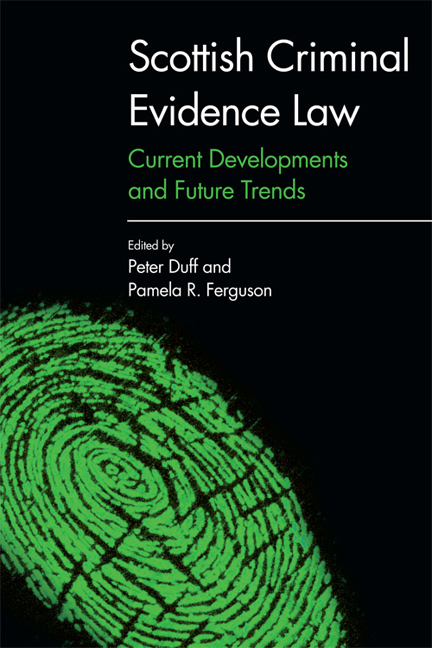Book contents
- Frontmatter
- Contents
- The Contributors
- Acknowledgements
- Table of Cases
- Table of Legislation
- Introduction
- 1 Cadder and Beyond: Suspects’ Rights and the Public Interest
- 2 ‘Access to Justice’ for Complainers? The Pitfalls of the Scottish Government’s Case to Abolish Corroboration
- 3 The Relevance of Sexual History and Vulnerability in the Prosecution of Sexual Offences
- 4 ‘Similar Fact’ Evidence and Moorov: Time For Rationalisation?
- 5 Hearsay in Scots law: Rethinking and Reforming
- 6 Eyewitness Identification Evidence and its Problems: Recommendations for Change
- 7 Assessing Witness Credibility and reliability: Engaging Experts and Disengaging Gage?
- 8 The process of Criminal Evidence Law Reform in Scotland: what Can We Learn?
- 9 Scottish Criminal Evidence Law Adrift?
- Bibliography
- Index
7 - Assessing Witness Credibility and reliability: Engaging Experts and Disengaging Gage?
Published online by Cambridge University Press: 24 April 2021
- Frontmatter
- Contents
- The Contributors
- Acknowledgements
- Table of Cases
- Table of Legislation
- Introduction
- 1 Cadder and Beyond: Suspects’ Rights and the Public Interest
- 2 ‘Access to Justice’ for Complainers? The Pitfalls of the Scottish Government’s Case to Abolish Corroboration
- 3 The Relevance of Sexual History and Vulnerability in the Prosecution of Sexual Offences
- 4 ‘Similar Fact’ Evidence and Moorov: Time For Rationalisation?
- 5 Hearsay in Scots law: Rethinking and Reforming
- 6 Eyewitness Identification Evidence and its Problems: Recommendations for Change
- 7 Assessing Witness Credibility and reliability: Engaging Experts and Disengaging Gage?
- 8 The process of Criminal Evidence Law Reform in Scotland: what Can We Learn?
- 9 Scottish Criminal Evidence Law Adrift?
- Bibliography
- Index
Summary
INTRODUCTION
Notwithstanding the increasing ‘scientisation’ of proof as represented by the rapid growth of new forms of evidence like CCTV and computer records, and the increasing (and now expected) use of forensic evidence in criminal cases, the evidence of witnesses who observe events and other facts remains crucially important in the criminal justice system. Certainly, witness reports are the most common reason for launching police investigations and, along with confessions, the principal determinant of whether crimes are solved. Furthermore, the fact that errors of identification always head the list – and by some margin – whenever attempts are made to assess the causes of miscarriages of justice provides another reason why witness evidence remains of prime importance for evidence lawyers. Ferguson, in this volume, has demonstrated problems that witnesses have in accurately perceiving, remembering and recalling the identity of criminal suspects. However, another reason why witness testimony is so problematic for the criminal justice system is the difficulties jurors and other fact-finders face in assessing, not just the accuracy, but also the honesty of witnesses. Thus, another significant cause of miscarriages of justice is the failure of fact-finders to detect perjury by prosecution witnesses, especially accomplices and others testifying in return for favourable treatment.
This chapter explores the extent of these difficulties and whether expert witnesses on the psychology of witnesses can and should assist fact-finders in improving their evaluation of witnesses of fact. At present, the Scottish courts have set their face against allowing psychologists and psychiatrists to testify about the general credibility and reliability of witnesses. Such experts (henceforth simply called psychological experts) have long been allowed to testify where issues of psychology and psychiatry are directly raised, for instance, by accused persons denying their fitness to plead or pleading mental disorder or diminished responsibility. More recently, as we shall see, expert testimony has been admitted on the indirect issue of whether witnesses as to facts in issue can be relied on, but only where such witnesses have ‘a recognised medical condition’ or other ‘special feature’ which affects their ability to provide reliable evidence.
- Type
- Chapter
- Information
- Scottish Criminal Evidence LawCurrent Developments and Future Trends, pp. 161 - 193Publisher: Edinburgh University PressPrint publication year: 2017



